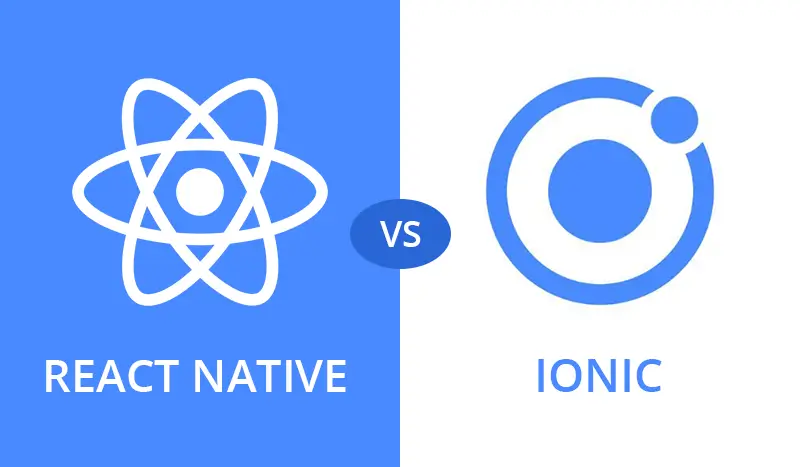The rapid increase in the number of mobile apps has turned mobile app development into the hottest topic of discussion now-a-days everywhere. Most of the organizations are picking mobility as the best option to expand the business ensuring profit. To meet the steadily changing business needs, there are a large number of technologies and platforms that are being introduced now and again. It additionally turns into a state of discussion of react-native vs. ionic to pick the correct framework to achieve the primary objectives.
React Native vs Ionic React, the difference can be simply explained as Ionic React is web-first, which means instead of accessing platform UI controls directly it implements native iOS and Android UI patterns through standards-based cross-platform technology. Whereas React Native works with the help of reacting that directly controls the platform UI.
Since Ionic is a framework for hybrid mobile app development and React Native is a cross-platform framework let’s discover how they both are different from each other.
i. Hybrid Mobile Apps vs. Native Apps
In the case of a native application, a specific language is used for a specific platform. That means if for the iOS platform you are using objective C and for Android, you are using Java then that can be called a native application development where as in the case of hybrid apps web technologies like HTML, JavaScript, CSS, etc. are used. Additionally, PhoneGap/Cordova platforms are utilized for providing native experiences as well as features.
React Native
Usually, iOS native apps are written in either Swift or Objective-C, and Android native apps are written in Java. Even though it is built using JavaScript and React, it delivers a seamless experience to its users through its all native components of iOS and Android. The beauty of React Native is that with a single code base it builds native apps, on both iOS as well as Android. The reason why apps built using React Native has a superior user experience in comparison to other frameworks is that it uses JavaScript other related components for coding and which are native to the platform.
Ionic Framework
The ionic framework is well-known for its principle of “write once – use everywhere”. It is because it allows developers to create just one application and use it on several platforms, irrespective of the device. It mainly focuses on developing hybrid mobile apps, Progressive Web Applications, and desktop-based applications. With React Native Ionicons you can access and use the iconicons developed by the Ionic framework team easily that ultimately gives an amazing look and feel to your application. Ionic ensures reduction of the development time significantly and also helps in validation of app’s concept effectively.
But since the code is reused across multiple platforms, hence hybrid apps will not have access to the native features (like camera, GPS, contacts, and so on) of the mobile device. To balance this Ionic uses Cordova plugins to integrate the native features to your apps that add an extra level of complicacy. But if we consider web applications, ionic makes them easier to be converted to Progressive Web Apps which can be downloaded just like other mobile apps.
Result
If you are willing to develop a mobile app that looks and feels like a native app but for cross-platform usage on iOS and Android, then React Native should be your right pick. On the other hand, if you are looking for an amazing user interface matching your website in the form of a mobile app, you can opt for Ionic instead.
ii. Popularity
Between React Native and Ionic, the popularity of react native is comparatively more and it is due to its truly native app development capacity using JavaScript and React. Ionic being a hybrid app somehow lacks the looks and feel of a truly native app. whereas; React Native applications and the components are all native to iOS and Android. React Native applications are so native that the end-user will not be able to distinguish between a native app and a React Native app and this makes React Native a popular framework.
Result
If you require to develop a truly native mobile app then as per the recent JavaScript survey, reactive native is the winner here.
iii. Technology
React Native
Instead of HTML, the UI of react native is written in JSX since it uses JavaScript. JSX comes with all the powers of JavaScript though it looks like any other language. This language is very easy to use and also comes with additional components.
Ionic
The flexibility of the ionic tech stack is a lot more as compared to React Native also it has many built-in features which make the development easier, faster, and smoother and it can be used for any web development without a second thought.
Result
Previously ionic apps were built using angular hence it was less flexible as compared to react-native but with the recent update it has been a lot more ductile hence it can be used in the development of any web framework and this makes Ionic a must pick in this category.
iv. Performance
React Native
React native builds native apps through JavaScript but it has the same building blocks that of native apps. Although it has one difference that it uses JavaScript to wrap around those blocks and it is a cross-platform framework. It ensures extraordinary performances as well as an observance for your mobile applications.
Ionic
Since Ionic is a hybrid framework it can’t help you build native applications and it can also result in some major performance concerns. Ionic also needs the Cordova plugin for accessing native features but the call-backs existing in native code may cause lag.
Result
Ionic being a great option for building presentable UI and faster development also comes with some serious performance challenges as compared to React Native. The Cordova plugin is building a web view instead of a native app so it may cause slowness but React Native having truly native components ensures better performance.
Pros and Cons of React Native vs Ionic
By considering the above we can differentiate the advantages and disadvantages of both React Native and Ionic as below-
Advantages of React Native
i. It uses React for sturdy web functionalities
ii. Written in a popular framework like Javascript
iii. Cross-platform native application development on iOS as well as Android
iv. A better user experience
Advantages of Ionic
i. Holds the capacity of building Cross-platform hybrid apps on both iOS and Android
ii. It supports modern frameworks such as Angular and Reacts although being primarily written in JavaScript
iii. Quite flexible as compared to other web frameworks
Disadvantages of React Native
i. Learning React is a must before moving to React Native
ii. For heavy apps based on animations, gaming, etc. React Native can’t be a primary choice since it is not suitable for such applications
iii. The cost will be higher as compared to Ionic
Disadvantages of Ionic
i. Performance-wise it is a minus as compared to native applications
ii. The additional plugin is a must to access native APIs and modules
iii. The plugin will only build a web view instead of the complete look and feel of a native app
Conclusion
Taking these above points into consideration React Native seems to be better framework here but still, there is not accurate answer to the question that “which one is the best framework?” It is because they both have their specialty.If you are willing to build cross-platform applications then set your preferences clearly and evaluate both the frameworks as per your requirement then you can decide which one should be your ideal pick.
We have a team of experienced Ionic as well as React Native developers who have already worked on several projects. Get in touch with OdiTek Solutions to hire React Native or Ionic developers for your next application development project.







